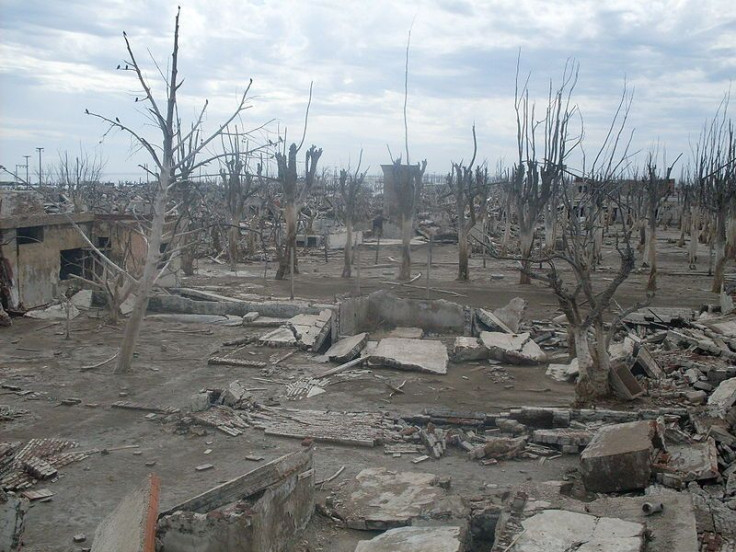
Epecuén, once a bustling resort located about 340 miles southwest of Buenos Aires, was converted into a ghost town in 1985 after the very lake which sustained it burst its banks and leveled the town. A quarter of a century later, the salty lake waters - 10 times saltier than the ocean, and long prized for their supposed therapeutic properties - have receded almost entirely. As tourists begin to trickle back to poke about the corroded automobiles, staircases to nowhere, and exposed tombs, they rediscover a ruin which in many ways could be seen as a symbol of the tumultuous years decades leading up to the town's destruction. In 1975, the provincial government built the Ameghino canal, an engineering project which strung together several basins and regulated the flow of water in lagoons across the region, a system intended to keep lagoons from drying up or flooding. But after the 1976 coup d'etat which overthrew the government of Isabel Perón and installed the "National Reorganization Process", a military junta headed by two generals and an admiral, supervision of the water flow between the various bodies halted.
From 1980 until Lake Epecuén broke its banks on November 10, 1985, the lake grew between 50 and 60 centimeters per year and threatened to breach the embankment built to protect the town. Far more rain than usual came down on the surrounding hills, and after a particularly wet winter, the waters broke through. The governor at the time did not visit until 3 months after the flooding occurred, having continued a trip abroad which took him through Italy and Russia. The flood consumed the town slow, reaching about 30 feet deep at its peak in 1993.
RELATED: Vermont Votes To Allow Immigrants Driver's License Privileges
Most of the town's inhabitants resigned themselves to leaving town; some of them managed to receive compensation from the government for about 50 percent of the value of their property - 15 years later. Many fled to Carhue, another lakeside town.
"We were left without money, houses or work. It was really difficult. You feel sad and impotent because it could have been avoided," one ex-resident Ricardo Zappia told La Nacion as he rested on the rubble of what had once been his hotel.
RELATED: Angel Cordero Said To Be 'Real Hero' In Cleveland Rescue
The AP spoke to one man, 82-year-old Pablo Novak, who refused to leave and remains living on the edge of town, welcoming visitors to town.
"Whoever passes nearby cannot go without coming to visit here," Novak said. "It's getting more people to the area, as they come to see the ruins."
© 2025 Latin Times. All rights reserved. Do not reproduce without permission.




